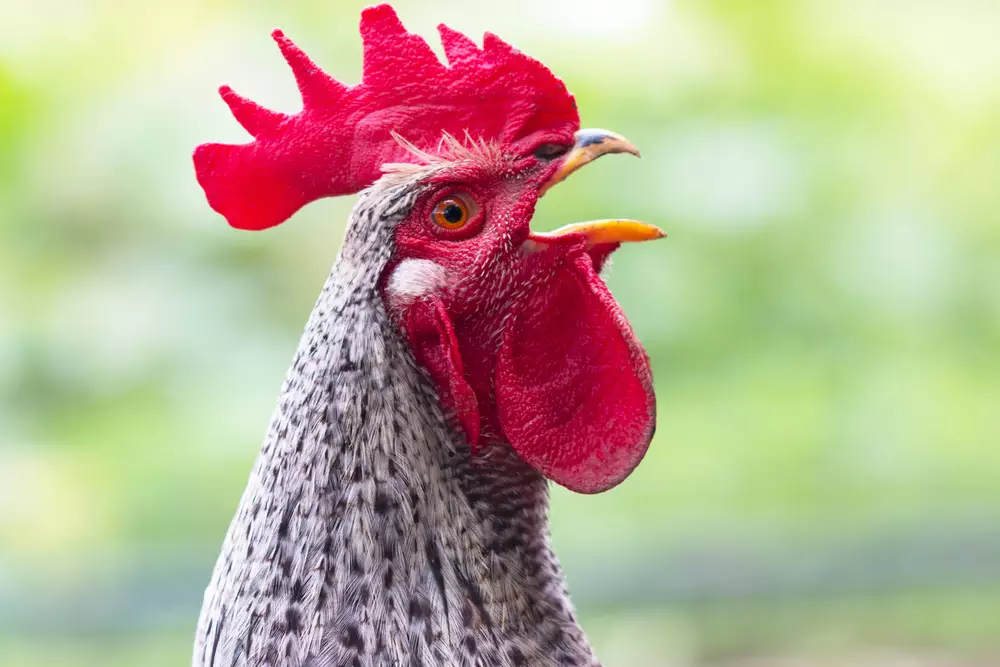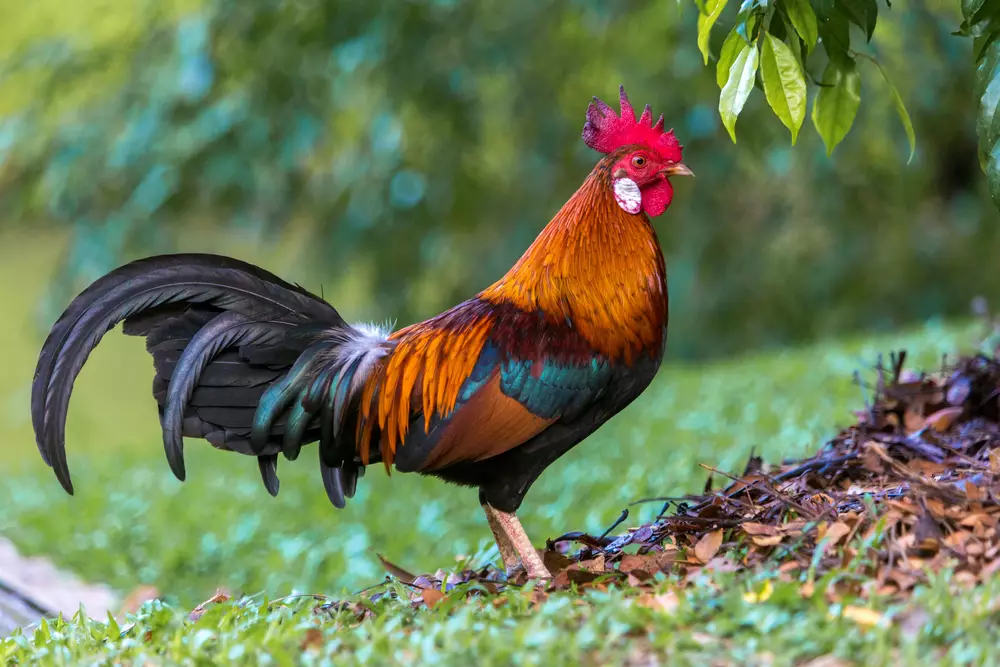Roosters are renowned for their distinctive crowing, often associated with the break of dawn. This stereotypical association of the rooster’s crow with Morning forms a significant part of folklore and popular culture. However, roosters’ crowing habits extend beyond the morning hours, with their vocalization patterns playing crucial roles in their behavior and social structure.
Contrary to popular belief, roosters crow throughout the day, not just in the Morning. This behavior is influenced by a variety of factors, including their internal biological clock, environmental triggers, and social hierarchies.
As we journey through this exploration of rooster crowing, we hope to offer a unique perspective on these magnificent creatures, providing a deeper understanding of their behavior and the factors influencing their crowing patterns.
What Does Crowing Mean for Roosters?
Crowing is more than just a wakeup call for the farm; it’s an integral part of a rooster’s behavioral repertoire. It is a means of communication used by roosters to express various emotions, establish their territory, and assert their dominance within the flock. Each crow is unique, often reflecting the individual rooster’s personality and status.
Do Roosters Only Crow in the Morning?
One of the most pervasive myths about roosters is that they only crow in the Morning. This belief, while widespread, doesn’t entirely encapsulate the rooster’s crowing habits. Scientific studies and observational data reveal that roosters crow throughout the day. The Morning crow is simply the most noticeable and stereotypically recognized because it often breaks the quiet of the early morning.

Why Do Roosters Crow in the Morning?
Rooster’s Circadian Rhythm
In the heart of this Morning serenade lies a rooster’s circadian rhythm, a biological clock that aligns their daily activities with the 24-hour day-night cycle. This internal clock is influenced by light and dark cues from the environment, prompting roosters to crow as the day begins to break.
Researchers have found that even in the absence of natural light, roosters maintained a roughly 24-hour cycle of activity, indicating the existence of an innate time-keeping mechanism.
The Start of a New Day
Morning represents the beginning of a new day, a time when roosters engage in crowing to signal the onset of their daily activities. The morning crow serves as a “cock-a-doodle-doo” alarm for the rest of the flock, getting the barnyard bustling and ready for the day.
A Call of Territorial Assertion and Mating
Morning crowing is also a means for roosters to assert their territory. As daylight breaks, roosters crow to signal their dominance and stake their claim over a specific area, warning other roosters to stay away.
This crowing also serves a secondary purpose – attracting potential mates. By crowing loudly and assertively, roosters can demonstrate their vigor and strength to hens, increasing their chances of mating.
What Other Factors Influence Rooster’s Crowing?
Although Morning and the rooster’s internal clock play a substantial role in crowing, they aren’t the sole influencers. Roosters’ crowing habits can also be affected by a range of other factors, from environmental stimuli to the social dynamics of their flock.
Environmental Triggers
Changes in the environment, such as variations in light or the presence of perceived threats, can trigger a rooster to crow. For instance, a sudden bright light might prompt a crow, even in the middle of the night. Similarly, the appearance of a predator can spur a warning crow to alert the rest of the flock.
Social Hierarchy and Territory
Roosters use their crow to assert dominance and establish their social rank within the flock. A dominant rooster often crows more frequently, asserting his position at the top of the pecking order. Roosters also crow to mark their territory, warning other roosters to steer clear.

Do All Roosters Crow at the Same Time?
Roosters’ crowing patterns are as unique as their individual personalities. While some might start crowing at the crack of dawn, others may choose to voice their crows a bit later. This variability can be influenced by their position in the social hierarchy, their breed, and their individual behavioral traits.
The “Leader Rooster” Concept
Within a group of roosters, the most dominant individual, often termed the “leader rooster,” typically crows first. He sets the tone for the day, with the subordinate roosters following his lead and crowing afterwards. This social order maintains harmony in the flock, ensuring each rooster knows his place.
The Influence of Breed and Individual Traits
Different breeds of roosters can exhibit varying crowing patterns. Some breeds are known to crow more frequently or louder than others. In addition, individual roosters within a breed can also have distinct crowing habits, influenced by their temperament and overall health.
Can We Control When and How Often a Rooster Crows?
Crowing is an integral part of a rooster’s behavior, deeply rooted in their biology and social structure. While it may be tempting to attempt to control this often noisy behavior, it’s essential to understand the potential implications and the ethics involved.
Possible Influences on Crowing Patterns
Certain methods can have some influence on when and how often a rooster crows. For example, regulating the rooster’s exposure to light can potentially alter their crowing patterns. By controlling when the rooster perceives it to be ‘daytime’ or ‘nighttime’, you might be able to manipulate their internal clock to some extent.
Similarly, reducing disturbances and potential triggers in their environment can also lessen the frequency of their crowing. This could include minimizing their exposure to sudden lights, loud noises, or perceived threats.
The Ethical Considerations
While these methods may influence a rooster’s crowing patterns, it’s important to remember that crowing is a natural behavior for these birds. Attempting to suppress or excessively control this behavior can lead to stress and may negatively affect their well-being.
Moreover, these methods are not foolproof. A rooster’s desire to crow is strong and often driven by instinctive needs. Even with attempts to control their crowing, they may still find a way to voice their distinctive call.
Frequently Asked Questions
As we reach the end of this comprehensive exploration of rooster crowing, let’s address some commonly asked questions about this fascinating behavior.
Is there a specific breed of roosters that crows more or less?
Yes, the frequency and volume of crowing can vary among different breeds of roosters. For instance, certain heritage breeds like the Leghorn are known for their frequent and loud crowing. On the other hand, some breeds like the Orpington tend to be quieter with less frequent crowing. However, individual behavior can vary, and a quiet breed doesn’t guarantee a quiet rooster.
Does the crowing of roosters annoy the other farm animals?
Roosters’ crowing is a natural part of the farmyard soundscape and is typically well-tolerated by other farm animals. However, if a rooster crows excessively or during unsociable hours, it can cause stress to the other animals.
Can roosters crow at night?
Yes, roosters can and do crow at night. Although their crowing is most frequent around Morning, roosters can crow anytime during the day or night. Factors like artificial light, disturbances, or perceived threats can trigger a rooster to crow even in the middle of the night.
Conclusion
The crowing of roosters is more than just an emblem of dawn; it’s a complex behavior shaped by their biological rhythms, environmental factors, and social dynamics. As we’ve explored, roosters crow throughout the day, not just in the Morning, using their distinctive call to communicate, assert dominance, and maintain their social hierarchy.
While it might be possible to influence when and how often a rooster crows, it’s important to consider the ethical implications and potential impact on the rooster’s well-being. After all, a crowing rooster is simply doing what comes naturally to it, and that’s something worth appreciating. As we strive to understand these fascinating creatures better, we continue to uncover the captivating intricacies of their behavior.